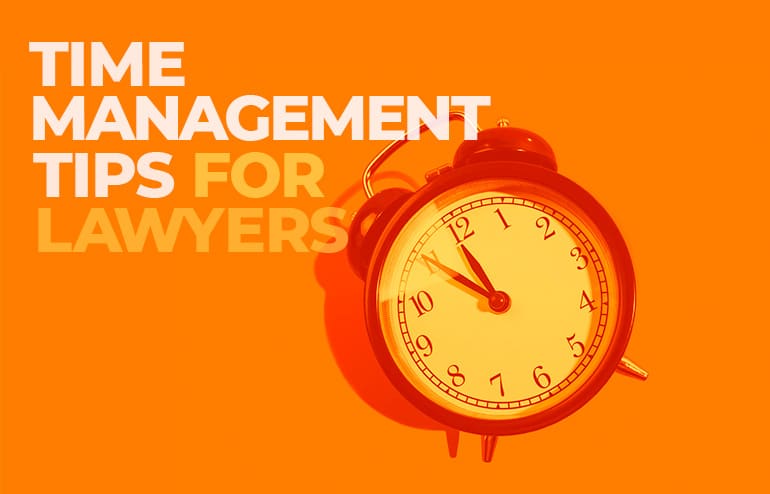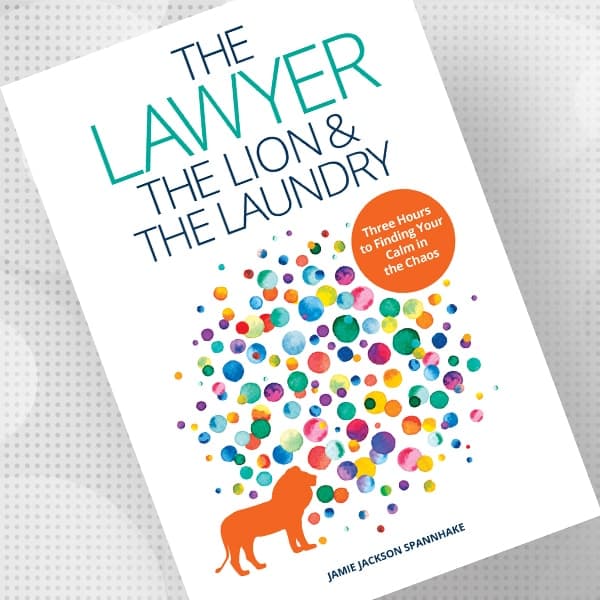Use these time management tips to improve your efficiency, reduce stress — and get more focused at work and home.

We all know those lawyers, the ones who have a thriving practice, time for family, loads of energy, and are enjoying the various aspects of their lives. How do they do it?
With planning and time management skills.
Time Management Is Not Just a Skill — It’s a Necessity
As we navigate through stringent deadlines, complex cases and loads of paperwork, the ability to squeeze every ounce of productivity from the workday is vital to our practice’s success — and our sanity. Whether you’re a seasoned attorney or a fledgling lawyer, mastering the art of time management is the key to maintaining a balance between caseloads, clients and personal well-being.
5 Effective Time Management Tips
Effective time management requires a strategy. Use these time management tips to improve your efficiency, reduce stress — and help you be more focused at work and home.
1. Determine your values and priorities.
Different people have different values and priorities. One lawyer will sacrifice quantity of time with his family so long as he has “quality time” with them. Another will determine that quantity is equally important and commits to never miss a single baseball practice or school meeting. One person needs a gym workout three days a week, while another is content with long walks and meditation. Whatever balance of priorities works for you and the important people in your life is the right balance.
If you are not clear about what’s most important to you, create your personal values statement using this simple technique.
(Also from Jamie: “Escape the Overworked and Overwhelmed Cycle”)
2. Focus 100% on what you are doing.
This sounds simple, but with multiple obligations, it can be difficult. When you are working, work is your priority, but the flip side is true, too. It is equally important to focus on family when you are with your family. Consider “transitioning” from work to home during your commute home. Or, if you work from home, take some downtime at the end of the workday — even if for only a few minutes — to get your brain back into neutral.
(Also from Jamie: “Mindfulness Matters: 5 Way to Focus on the Now”)
3. Plan everything and put it on the calendar.
Keep one calendar with everything in it — work deadlines and appointments, family obligations and personal items (like exercise) — and sync it to all devices. By having everything scheduled, it is easier to stay focused on the task at hand. If it’s on the calendar, you can focus on what you are doing, whether it is legal or personal or family, without worrying about whether you are forgetting something else important.
Of course, scheduling everything requires advance planning. That’s why it’s important to make planning a regular practice. One can plan daily, weekly or monthly. Then, if things don’t go the way you planned, recalibrate, and review at the end of each day.
(Also from Jamie: “Organize Your Time With a Good, Thoughtful Plan”)
4. “Chunk” your work into manageable timeframes and take breaks.
Try to work in 45- to 50-minute increments. Then switch to something else if possible. It’s easier to keep focused in smaller chunks of time. You needn’t switch to a completely separate project; it could be a different kind of task within the same case, for example, switching from writing a brief to reviewing documents or responding to client emails. (Editor’s note: “Deep Work” author Cal Newport has published a new edition of “The Time-Block Planner: A Daily Method for Deep Work in a Distracted World,” which helps integrate the time-blocking concept into your day.)
5. Use your time creatively.
Practicing law is time-consuming. We lawyers must be willing to put in the hours necessary to get the job done and serve clients to the best of our abilities. When we get creative, we can find snippets of time that we need to be successful. For example, mornings before others wake up, or evenings after everyone else goes to bed, can provide the needed extra time.
In addition, smart multitasking can be helpful. Despite research on the negative impact of multitasking on productivity, there are good ways to multitask. For example, dictating while walking or driving to work is a good way to record creative ideas and task lists.
(Also from Jamie: “5 Reasons You Need a Nature Fix”)
Enjoy Work and Personal Time More
Embracing these time management tips will help you navigate competing work and life responsibilities. That, in turn, will help ensure that you not only meet deadlines but also excel personally and professionally.

Three Hours to Finding Your Calm in the Chaos
By Jamie Jackson Spannhake
In this bestselling book written for lawyers, former Biglaw litigator Jamie Spannhake helps you clarify your desires and set priorities so you can reclaim your time and enjoy your life. Available in soft-cover and digital format.

Don’t miss out on our daily practice management tips. Subscribe to Attorney at Work’s free newsletter here >






















